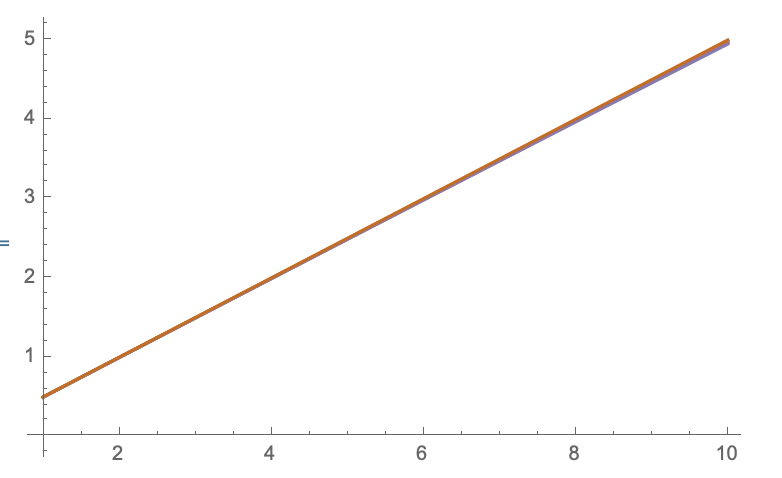$\int_{0}^{1}u^k\cot{\frac{\pi(1-u)}{m}}\sin{\frac{2\pi n(1-u)}{m}}\,du$
-
2$\begingroup$ Questions should have an explanation of what the problem is that you're asking about, what the context in which it arose is, what you've already tried to do, and where you are stuck. The absence of any words whatsoever in the post explains the downvotes, I'm guessing. $\endgroup$– Greg MartinCommented Oct 27, 2018 at 22:04
-
$\begingroup$ You could check the Riemann–Lebesgue lemma to see if it proves that your integral tends to $0$. $\endgroup$– Greg MartinCommented Oct 27, 2018 at 22:05
2 Answers
The limit equals $m/2$ when $m>1$ or $k\geq 1$, and it equals $m$ when $m=1$ and $k=0$. I provide the proof for $m>1$ below, the other cases being very similar.
Assume that $m>1$. The integral equals $m J_{m,k}$, where $$J_{m,k}(n):=\int_0^{1/m}(1-mu)^k\cot(\pi u)\sin(2\pi n u)\,du,$$ hence it suffices to show that $J_{m,k}(n)\to 1/2$ as $n\to\infty$. We observe that $$J_{m,0}(n)-J_{m,k}(n)=\int_0^{1/m}f_{m,k}(u)\sin(2\pi n u)\,du,$$ where $$f_{m,k}(u):=\left(1-(1-mu)^k\right)\cot(\pi u)$$ is continuous and bounded on $(0,1/m)$. Therefore, by basic Fourier analysis, the limit of $J_{m,0}(n)-J_{m,k}(n)$ is zero, hence it suffices to show that $J_{m,0}(n)\to 1/2$. Let us decompose $J_{m,0}(n)$ as $$J_{m,k}(n)=\int_0^{1/2}\cot(\pi u)\sin(2\pi n u)\,du-\int_{1/m}^{1/2}\cot(\pi u)\sin(2\pi n u)\,du.$$ As $m>1$, the function $\cot(\pi u)$ is continuous and bounded between $1/m$ and $1/2$, therefore the second integral tends to zero by basic Fourier analysis. Now we observe that the first integral is constant $1/2$, which finishes the proof. Indeed, \begin{align*} \int_0^{1/2}\cot(\pi u)\sin(2\pi n u)\,du&=\int_0^{1/2}\cos(\pi u)\sum_{k=1}^n 2\cos(2\pi(2k-1)u)\,du\\[8pt] &=2\sum_{k=1}^n\int_0^{1/2}\cos(\pi u)\cos(2\pi(2k-1)u)\,du. \end{align*} On the right hand side, the first term equals $1/4$, while all the other terms are zero, hence the left hand side equals $1/2$ as claimed.
$$I_{k,m}(n)=\int_{0}^{1}u^k\cot\left({\frac{\pi(1-u)}{m}}\right)\sin\left({\frac{2\pi n(1-u)}{m}}\right)\,du$$
$$\lim_{n\rightarrow\infty} I_{k,m}(n)=\frac{1}{2}m, \;\;\text{for}\;\; m\geq 1\;\; \text{and any} \;\;k\in\{1,2,3,\ldots\}.$$
No proof (yet), but the plot below gives the numerical evidence. It is a collection of graphs of $I_{k,m}(n)$ as a function of $m$, for fixed $n=500$ and $k$ taking the values 1,2,3,4,5.

